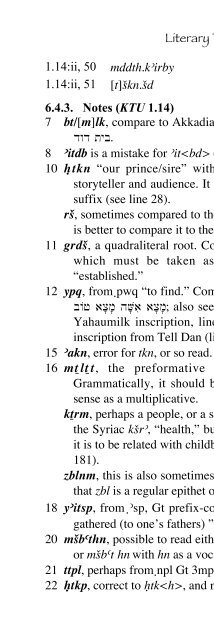A Primer on Ugaritic: Language, Culture, and Literature - enenuru
A Primer on Ugaritic: Language, Culture, and Literature - enenuru
A Primer on Ugaritic: Language, Culture, and Literature - enenuru
Create successful ePaper yourself
Turn your PDF publications into a flip-book with our unique Google optimized e-Paper software.
1.14:ii, 50 mddth.k}irby<br />
1.14:ii, 51 [t]s¥kn.s¥d<br />
Literary Texts 129<br />
6.4.3. Notes (KTU 1.14)<br />
7 bt/[m]lk, compare to Akkadian bit h˙umri (“house of Omri”) or<br />
dwd tyb.<br />
8 }itdb is a mistake for }it (from }bd). “to destroy.”<br />
10 htkn “our prince/sire” with the 1cp suffix -n referring to<br />
storyteller <strong>and</strong> audience. It is also possible that this is a 3ms<br />
suffix (see line 28).<br />
rs¥, sometimes compared to the Arabic rws¥, “to increase,” but it<br />
is better to compare it to the Hebrew rs¥s¥, “to crush.”<br />
11 grds¥, aquadraliteral root. Compare Hittite gurtas¥, “fortress,”<br />
which must be taken as a feminine, i.e., with mknt<br />
“established.”<br />
12 ypq, from pwq “to find.” Compare Prov. 18:22, hÎwhyEm Nwøxr qRpÎ¥yÅw<br />
bwøf aDxDm hDÚvIa aDxDm; also see Yahimilk inscripti<strong>on</strong>, lines 6–7;<br />
Yahaumilk inscripti<strong>on</strong>, line 9. See the recently discovered<br />
inscripti<strong>on</strong> from Tell Dan (line 5).<br />
15 }akn, error for tkn, or so read.<br />
16 mtltt, the preformative m- is difficult to explain.<br />
Grammatically, it should be a fracti<strong>on</strong>, but it makes more<br />
sense as a multiplicative.<br />
ktrm, perhaps a people, or a social class. Some compare it with<br />
the Syriac ks¥r}, “health,” but this makes little sense. Perhaps<br />
it is to be related with childbirth (e.g., Wyatt, Religious Texts,<br />
181).<br />
zblnm, this is also sometimes understood as a people, but note<br />
that zbl is a regular epithet of Baal.<br />
18 y}itsp, from }sp, Gt prefix-c<strong>on</strong>jugati<strong>on</strong>; compare Psan, “to be<br />
gathered (to <strong>on</strong>e’s fathers) ” in Biblical Hebrew.<br />
20 ms¥b{thn, possible to read either ms¥b{thn with hn as a 3fp suffix<br />
or ms¥b{t hn with hn as a vocative particle.<br />
21 ttpl, perhaps from npl Gt 3mp.<br />
22 htkp, correct to htk, <strong>and</strong> note the graphic similarity


